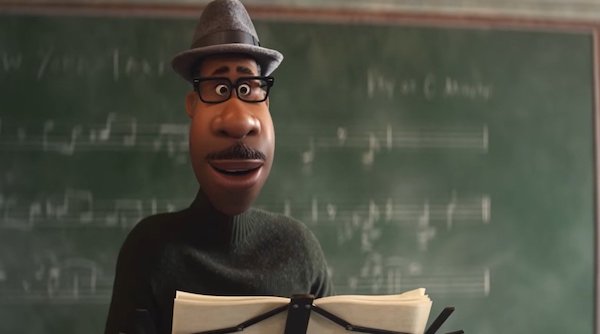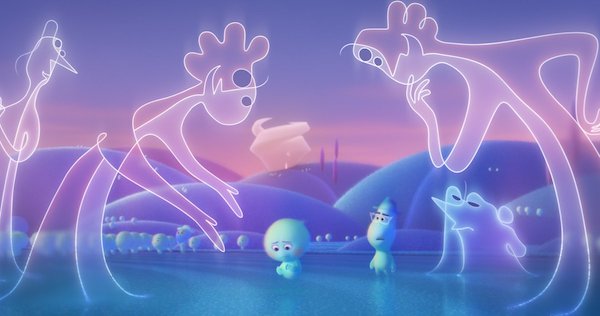After years as the industry’s best studio, Pixar suffered through hit-or-miss releases, some of the worst being poorly packaged sequels. One shining exception was 2015’s Inside Out, directed by Pete Docter. It was a movie that combined exhilarating intellectual ideas with stunning visuals and superb performances.

Soul, directed and co-written by Docter, could be seen as a sequel of sorts to Inside Out. Like that film, Soul unfolds in two worlds: a photo-realistic city, in this case New York, and an abstract rendering of the afterlife with an accompanying limbo of the unborn.
Much of the press has focused on the fact that Soul is the first Pixar feature to star an African-American, musician Joe Gardner (voiced by Jamie Foxx). The studio took pains to portray Joe and his culture accurately, hiring playwright Kemp Powers (and eventually assigning him co-directing credit) as well as consultants like Herbie Hancock and Jon Batiste.
Joe still fits comfortably into the Pixar mold: an unhappy, disillusioned underachiever trying desperately to justify his life. You could slip him into any number of movie fantasies about the intersection of life and death—like David Niven’s doomed pilot in A Matter of Life and Death, ascending a stairway to his obliteration. Or Albert Brooks in Defending Your Life, bitching against fate in gauzy clouds of dry ice.
Like Inside Out, the stakes in Soul are high: not just death, but complete annihilation. That’s because Joe is on the cusp of dying after an accident on his way to a life-changing gig. Battling afterlife bureaucracy to return to his earthly body, much like Robert Montgomery’s boxer in Here Comes Mr. Jordan, Joe will learn lessons, impart some wisdom, and experience life in ways he couldn’t before. Otherwise, there’s the light at the end of the tunnel, a blinding white bug zapper.
Learning lessons is what Joy (Amy Poehler) did in Inside Out, and like her, Joe will be imperiled in the sort of black carbon sandscapes that in Docter’s vision stand in for total death. Joe also faces similar deadlines, both in the afterlife (prelife?) and on Earth. And like Inside Out, up pops a deus ex machina: talk-show host Graham Norton as a needlessly hyper New Age Captain Crunch.

Is it a cop out to follow previous Pixar formulas so rigidly, to insist on bogus cliffhangers and contrivances that gloss over the very real crises that Joe is facing? Like James Stewart’s George Bailey in It’s a Wonderful Life, and face it just like any adult at one time or another, Joe worries that he wasted his life, that he didn’t do enough or try hard enough, that he didn’t live up to his image of himself. Tough medicine for kids, everyone else too. The sugar coating here feels less authentic than in Inside Out, less germane. There’s less real reckoning with the realities of life (e.g., loss is inevitable, sorrow necessary), more easy fixes that don’t ring true. Joe gets everything he wanted and more, while viewers get to see a familiar plot line play out as expected. But in a way that’s criticizing Soul for doing what it does so well.
The animation outdoes even Pixar’s high standards. Crisp and focused in the real-world segments, shimmering and abstract in the others. When I interviewed Docter for Inside Out, he spoke about the influence of Warner Bros. cartoons like 1938’s Porky in Wackyland, not just the proto-psychedelic landscapes, but on how characters could shape-shift, distort into different figures and even dimensions. Here a series of mentors, all named Jerry, take on flat, two-dimensional, Cubist aspects, a delightful touch that evokes UPA’s more stylized animation of the 1950s. Meanwhile, Joe’s journey to death on the sidewalks of New York has the tempo and gags of a classic Popeye cartoon, complete with muttered asides.
On top of its other achievements, Soul is a love letter to New York, with its crowded subways, its rowhouses, shops, skylines, and improbable seasons. Visually spectacular, filled with music (including an excellent score by Trent Reznor and Atticus Ross), and crammed with all kinds of comedy, from puns and pratfalls to spirals into Beckett, Soul ranks with Pixar’s best.


